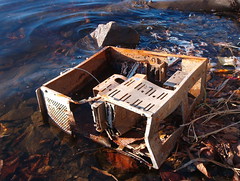There’s a great presentation by William McDonough speaking at the Bioneers Conference back in 2000 about designing for the future available via Google Video (thanks Metafilter). He has a revolutionary perspective on how humanity needs to think about its current institutions and processes compared to the kind of future we’re currently designing for ourselves.
 He talks about the design flaws in a society that doesn’t yet respect the rights of non human species or the future generations of life. The Endangered Species Act was passed only 30 years ago, the first acknowledgement that another species has a right to exist. He discusses the design flaws in the Industrial Revolution that led to man’s intent to constrain nature.
He talks about the design flaws in a society that doesn’t yet respect the rights of non human species or the future generations of life. The Endangered Species Act was passed only 30 years ago, the first acknowledgement that another species has a right to exist. He discusses the design flaws in the Industrial Revolution that led to man’s intent to constrain nature.
McDonough goes on to talk about waste and the idea of “throwing things away”. Such phrases and concepts will undoubtedly be challenged by our children who have to own the future waste problems today’s generations are creating for them. He asks how you would map the plutonian disposal locations buried deep below the earth’s surface today for generations thousands of years from now who will surely need to know where we put it.
Anyhow, this presentation really captured my imagination in several ways including the important question of what we are designing into our future world with today’s Internet innovations. What can we do today to at least mitigate if not correct the known errors in judgment made to date?
For example…
Social Decay
The tools of the Internet have enabled us to connect to other geographically diverse people in amazing ways at amazing speeds at low cost. In most cases, those connections are lighter and looser and less involved than the connections people create when spending time doing things together.
Are the lightweight connections on the Internet costing us time spent face-to-face? Are we isolating ourselves from the real world as we bury ourselves under the many media experiences surrounding us all the time? How can the Internet connect us more deeply and meaningfully to the people and the things that matter rather than distance us?
Information Classes
Knowledge is power. But the power of knowledge should never be used for subjugation. Couldn’t we mitigate abuse of knowledge by giving everyone access to as much knowledge as they want to have? Is Internet access a right on a global scale that should be protected for all? Should objective information such as independent journalism be not just a protected public service but a requirement for modern global society?
Energy Consumption
 Photo: Fully Armed Vishnu |
The power requirements needed to sustain all the web sites in the world are escalating. Are there other ways to power the Internet? Can computers and networks use less power and create less waste? Is it possible to have a entirely recyclable phone? More importantly, can they create power and reduce waste?
McDonough challenges traditional capitalism and government policy alike. He sees a triumverate forming where a “Bill of Responsibility” much like the “Bill of Rights” might reconstruct the incentives for making the world a better place. It’s not about creating efficiency but rather creating a design for growth.
The questions is, “What do you want to grow?”
Comments are closed.